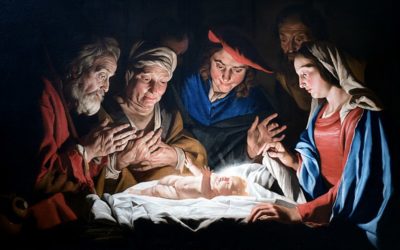This week’s Come Follow Me lesson focuses on one of the most important principles of the restored gospel: revelation.
Joseph Smith’s First Vision in 1820, the appearance of Moroni to him in 1823 and many times thereafter, and the Prophet’s other spiritual experiences establish that God will speak to His children on earth if they will try speaking with and listening to him. Revelation is not a gift limited to prophets. It is available to everyone.
In an article in the January 2021 Liahona titled “Grow into the Principle of Revelation,” President Russell M. Nelson wrote to us all, “I encourage you to take the necessary steps to hear the Lord better and more often so that you can receive the enlightenment He wants to give you.”
Indeed, without receiving revelation, no one can fully understand Joseph Smith’s experiences or much of the other history and doctrine of the Church. Joseph Smith’s early revelations made it possible for him to say, “I have learned for myself” (JS—H 1:20). Sections six through nine of the Doctrine and Covenants 6–9 show how an early investigator, Oliver Cowdery, also came to know for himself the truth and importance of the work in which he and Joseph were engaged.
They show how everyone who is willing can come to know.
Doctrine and Covenants 6
Oliver Cowdery was a schoolteacher who boarded with Joseph Smith’s parents and their family near Palmyra. According to Lucy Mack Smith, Joseph’s mother, Oliver had not been in the Palmyra area long before “he began to hear about the plates from all quarters.” He pressed Joseph Smith’s father to tell him about them, and Joseph Sr. hesitated for some time before finally giving in. Oliver thought deeply about what he heard.
Meanwhile, down in Harmony, Pennsylvania, Joseph and Emma were living near her parents, Isaac and Elizabeth Hale, and the situation was growing tense. The first few weeks after the Smiths moved to Harmony, they had lived with her parents in their home. Things had started off fine but took a turn for the worse when the topic of the gold plates came up. Like many a good father, Isaac Hale wanted his new son-in-law to get a real job and settle down to supporting his daughter. Isaac demanded to see the plates, and when Joseph said he couldn’t show them to him, Isaac ordered them removed from the house.
Things improved when Joseph and Emma went to live in a small farm home originally built for Emma’s brother on land purchased from Isaac. The land and home had since been sold back to Isaac, and he was willing to have Joseph live there with Emma and work the land.
In the agonizing days after the Book of Lehi manuscript disappeared, the Lord took the plates from Joseph. After months of sore repentance, Joseph received them again. But as the spring of 1829 approached, with the need to plow and sow, Joseph could not farm fulltime, as his father-in-law expected, and translate the plates, as the Lord commanded. What should he do?
During Joseph’s repentance period, the Lord taught him, “You should not have feared man more than God” (Doctrine and Covenants 3:7), and he commanded Joseph “to yield to the persuasions of men no more” (Doctrine and Covenants 5:21). Joseph knew what he must do. He must obey the Lord over Emma’s father. But he also knew the potential consequences. If he did not work the farm, his father-in-law might evict him from the house.
Joseph had to rely on the Lord, who promised, “I will provide means whereby thou mayest accomplish the things which I have commanded thee” (Doctrine and Covenants 5:34). “We had become reduced in property,” Joseph wrote in his 1832 history, “and my wives father was about to turn me out of doores.” Joseph did not know where they would go if that happened. And he had another problem. If he was going to make serious progress in translating, he needed a fulltime scribe. “I cried unto the Lord,” Joseph resolved, “that he would provide for me to accomplish the work whereunto he had commanded me.”
The Lord answered the prayer by showing Oliver Cowdery the plates in a vision and confirming to him their truthfulness. Oliver felt compelled to help Joseph and traveled with Joseph’s brother Samuel to Harmony. Samuel would help Joseph work the farm, and Oliver would serve as scribe for the translation. Oliver and Samuel arrived in Harmony on April 5, 1829, and the next day, Oliver helped Joseph buy the farm and home from his father-in-law, reducing the likelihood of eviction.
With the immediate problems solved, Joseph began translating again on April 7, and Oliver served as scribe in what he later called “days never to be forgotten.” Like Martin Harris before him, Oliver wanted a further witness from the Lord about the work. Joseph inquired of the Lord and received the revelation that is now section 6 of the Doctrine and Covenants.
The revelation is rich and complex. In verses 14 and 15, the Lord teaches Oliver to remember the spiritual promptings or revelations he had already received. “As often as thou hast inquired,” the Lord reminded Oliver, “thou hast received instruction of my Spirit.” In fact, the Lord pointed out, “If it had not been so, thou wouldst not have come to the place where thou art at this time.”
There is a lesson for all of us in this. The Lord’s guidance has gotten us to where we are spiritually. We must learn not to discount past answers from the Lord just because we want another one now.
In his patience, the Lord does not say, “How many times do I have to tell you?” Instead, he teaches Oliver how to recognize the Spirit. In verse 15, he says, “Behold, thou knowest that thou hast inquired of me and I did enlighten thy mind; and now I tell thee these things that thou mayest know that thou hast been enlightened by the Spirit of truth.” This “enlightenment” is revelation.
Shortly after his escape from Liberty Jail, Joseph gave an address in which he described revelation. ” A person may profit by noticing the first intimation of the Spirit of Revelation,” he said. “For instance when you feel pure Inteligence flowing unto you it may give you sudden strokes of ideas that by noticeting it you may find it fulfilled the same day or soon.” Another way of telling that these thoughts are revelation, he said, is that “those things that were presented unto your minds by the Spirit of God will come to pass.” By paying attention to these things, he said, “and thus by learning the Spirit of God. & understanding it you may grow into the principle of Revelation. until you become perfect in Christ Jesus.”
In April 2018, shortly after becoming president of the Church, President Russell M. Nelson also spoke about revelation and quoted Joseph’s 1839 statement: “Pray in the name of Jesus Christ about your concerns, your fears, your weaknesses—yes, the very longings of your heart. And then listen! Write the thoughts that come to your mind. Record your feelings and follow through with actions that you are prompted to take. As you repeat this process day after day, month after month, year after year, you will ‘grow into the principle of revelation.’”
In Doctrine and Covenants 6:22–24, the Lord reminds Oliver of the night vision and confirmation he received earlier. Oliver had never told Joseph about this, and Oliver soon wrote to his friend David Whitmer, reporting that Joseph “told him secrets of his life that he knew could not be known to any person but himself, in any other way than by revelation from the Almighty.”
Doctrine and Covenants 7
Section 7 is also about revelation, although that may not be apparent to the casual reader. The key point to remember is that this revelation is given in April 1829 as Oliver is watching Joseph translate. As best we can tell, Joseph’s translation of the Book of Mormon did not require him to look constantly at the plates. Instead, he looked at the “interpreters” or other seer stones and obtained the text from them. (See 215 Ensign article “Joseph the Seer.”) That may surprise Church members who concept of the revelatory process comes from art that shows Joseph with the plates open in front of him.
It may have surprised Oliver as well. He might have wondered, “Why doesn’t Joseph have the plates open in front of him as he is translating them?” The answer, of course, is that Joseph doesn’t understand the characters or language on the plates. Instead, he uses a device the Lord has given him to get the translation by revelation.
Many of us have used our phones and an online program or app to translate languages we don’t understand. Why should it be surprising that Joseph did something similar?
The headnote of section 7 points out, “The revelation is a translated version of the record made on parchment by John and hidden up by himself.” Joseph and Oliver received the translation when they “inquired through the Urim and Thummim.” Where was the parchment? Apparently not in their possession. In fact, it might have been on the other side of the world. But what a great lesson to Oliver on the revelatory translation process.
Doctrine and Covenants 8
Many Church members quote and like section 8 for what it says about revelation. But they likely miss some key points because they don’t understand the historical context of the revelation. Joseph and Oliver live in a society steeped in the Bible. People in that culture understood and believed in the Bible in a way that is hard to comprehend in our skeptical society today. They believed that God could work through Moses’ rod, for example, in doing miracles before Pharaoh or providing water from a rock. In fact, Oliver had tried using a rod himself.
Section 8 deals with Oliver’s gift. (Please read the article “Oliver Cowdery’s Gift” on the Church’s website to understand more.)
Once you understand the historical background, you can see what the Lord is trying to teach Oliver in section 8. Like many people in Oliver’s day and now, people mistakenly think that power exists in an instrument like a seer stone or rod. This is a “magical” view of the world. Think about the many movies today in which characters go on a quest to get a ring, or a key, or a sword, or some other object that supposedly has “magical” powers. In section 8, the Lord is trying to teach Oliver that Moses did not do miracles by magic. Instead, he operated by the Spirit.
In using his rod, Oliver is not using a “magical” instrument. There is no power in the object. Here is what the Lord teaches him:
“Yea, behold, I will tell you in your mind and in your heart, by the Holy Ghost, which shall come upon you and which shall dwell in your heart. Now, behold, this is the spirit of revelation; behold, this is the spirit by which Moses brought the children of Israel through the Red Sea on dry ground.”
In other words, the power is in the Spirit, not the object. God at times uses objects to focus people’s faith. Consider objects in the Bible like Moses’ rod, the brass serpent on the rod, or the mud Jesus puts on someone’s eyes. Consider objects we use in performing ordinances today, such as water for baptism, white clothing for baptism or in the temple, and consecrated oil for anointing the sick. Are these things magical? No. But they do provide wonderful symbolism.
That is an important lesson the Lord teaches Oliver is section 8.
Doctrine and Covenants 9
Section 9 is the most familiar of the sections studied this week in Come Follow Me and the one we quote most often. It is a beautiful instruction on how revelation works. It also points out that there is order in the Lord’s kingdom when it comes to revelation.
The Lord calls people to various roles in the Church, and those roles entitle people to receive revelation related to their responsibility but not beyond it. If you are ward elders quorum president or stake Primary president, you can receive revelation related to your responsibility. But the elders quorum president can’t receive revelation for the stake Primary, and the stake Primary president can’t receive revelation for the ward elders quorum.
Everyone can received revelation for herself or himself. But only the president of the Church can receive revelation for the whole Church. Section 9 essentially teaches Oliver that yes, he could receive revelation just like Joseph if that was his responsibility. But it wasn’t. Joseph was called to be the prophet and Oliver to be the scribe.
For More on Oliver Cowdery
For additional information on Oliver Cowdery, see the biographical entries on ChurchofJesusChrist.org and the Joseph Smith Papers website.
(Photo credit for image at top of post: Oliver Cowdery, public domain, copied from https://www.josephsmithpapers.org/person/oliver-cowdery.)



